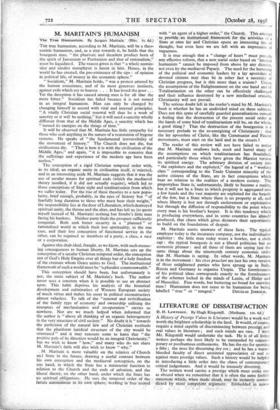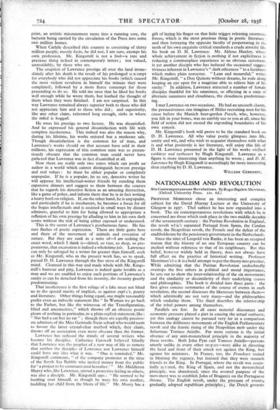LITERATURE OF DISSATISFACTION
D. H. Lawrence. By Hugh Kingsmill. (Methuen. los. 6d.) , . . _ A History of Prestige Values in Literature would be a work well worth the brightest scholarship in the land. It would, of Course, require a mind capable of discrinainating between prestigeand real values in literature ; and such minds are rare. I wish Mr. Kingsmill would undertake the task. He is of all living writers perhaps the least likely to be stampeded by contem- porary or posthumous enthusiasms. He has the eye for spotting a fake ; the nose for discerning dry rot ; and he has a warm- blooded faculty of direct unstinted appreciation of real as against mere prestige values. Such a history would be helpful in introducing a little order into the chaos of contemporary critical judgements. And it would be intensely diverting.
The written word carries a prestige which must strike one as absurd when we remember that it is often the same foolish statement Which, when made aloud, may be instantly contra- dicted by more competent argument: - Ethbedded in nays- .
print, an artistic misstatement turns into a running sore, the baderia being carried by the circulation of the Press into some two million homes.
When Carlyle described this country as consisting of thirty million people, mostly fools, he did not, I am sure, exempt his own profession. Mr. Kingsmill is not a fool—a rare and_ precious thing indeed in contemporary letters ; not valued, unavoidably, by those who are.
The eruption of Lawrence prestige all over the land imme- diately after his death is the result of his prolonged ccn'.empt for everybody who did not appreciate his books (which caused the most violent revulsion in himself the minute they were completed), followed by a more fierce contempt for those pretending to do so. He told me once that he liked his books well enough while he wrote them, but loathed the thought of them when they were finished. I am not surprised. In this way Lawrence remained always superior both to those who did not appreciate him and to those who did ; and superiority, like any other claim, reiterated long enough, sinks in where the mind is bogged.
He owes his prestige to two factors. He was dissatisfied. And he expressed his general dissatisfaction with life with complete incoherence. This indeed was also the reason why, during his lifetime, his works enjoyed but a moderate sale. Though dissatisfaction is the common lot of man, and Lawrence's works should on that account have sold in their millions, his expression of this common state was so preten- tiously obscure that the common man could never have gathered that Lawrence was in fact dissatisfied at all.
Now there are really only two states which can profit an author in a world which cannot distinguish between prestige and real values : he must be either popular or completely unpopular. If he is a popular, let us say, detective writer he will appease his intellectual-writer friends by standing them expensive dinners and suggest to them between the courses that he regards his detective fiction as an amusing distraction, like a game of poker, and inform them that he is in fact writing a heavy book on religion. If, on the other hand, he is unpopular, and particularly if he is incoherent, he becomes a focus for all the bogus intellectuals and is assisted in small ways by distant admirers, grateful to him for being allowed to appropriate a reflexion of his own prestige by alluding to him in his own dark terms without the risk of being either exposed or understood. This is the secret of Lawrence's posthumous fame. He has rare flashes of poetic expression. There are little gems here and there of the movement of animals and evocation of nature. But they are sunk in a mire of—I am seeking the exact word, which I think is—drivel, so vast, so deep, so pre- posterous, that excavation is indeed a wholetime job. Lawrence can only be salvaged by a writer far greater than,himself, such as Mr. Kingsmill, who in the present work has, so to speak, passed D. H. Lawrence through the fine sieve of the Kingsmill mind. Cleansed in this way and made whole with Mr. Kings- mill's humour and pity, Lawrence is indeed quite lovable as a man and we are enabled to enjoy such portions of Lawrence's sanity as can be detached from his insanity, the insanity greatly predominating.
That incoherence is the first refuge of a fake must not blind us to the special merits of implicit, as against expl: et, poetry and literature. Other things being equal, one might reasonably prefer even an imbecile statement like " In Woman we go back to the Father, but like the witnesses of the Transfiguration, blind and unconscious," which throws off an obscure poetic gleam of nothing in particular, to a plain explicit statement, like : " Nat had a cat but no rat " ; though there are equally passion- ate admirers of the Miss Gertrude Stein scherl who would seem to favour the latter crystal-clear method which, they claim, throws off an association even more obscure than the former. Lawrence has seduced the minds of several writers who became his disciples. Catherine Carswell believed blindly that Lawrence was the prophet of a new way of life so remote that neither the disciples of Lawrence nor Lawrence himself could have any idea what it was. " One is reminded," Mr. Kingsmill comments, " of the company promoter at the time of the South Sea Bubble who invited money from the public for ' a project to be communicated hereafter.' " Mr. Middleton Murry who, like Lawrence, stirred a protective feeling in others,, was also a disciple. Mr. Kingsmill says : " He seemed to be bending over himself, as though he were his own mother,_ huddling her child from the blasts of life." Mr. Murry has a
gift of laying his finger on that little trigger releasing enormou. forces; which is the most precious thing in poetic literature ; and then betraying the opposite faculty of perpetrating in tit,: teeth of his own exquisite critical standards a crude atrocity lik, his book on D. H. Lawrence. Mr. Aldous Huxley, whos, whole achievement in fiction is/nothing if not explicitness in reducing a commonplace experience to an obvious statement. is yet another disciple who has 'reduced the occasional sugges- tiveness inherent in Lawrence's " dark otherness " to a lucidness which makes plain nonsense. " Lean and mournful," writes Mr. Kingsmill, " a Don Quixote without dreams, he rode along keeping an eye open for a magician able to relieve him of his sanity." In addition, Lawrence attracted a number of female disciples thankful for his sunniness, so affecting in a state of alternate sunniness and cloudiness, the cloudiness predominat-
I met Lawrence on two occasions. He had an uncouth charm, the persuasiveness one imagines of Hitler recruiting men for his cause before the Munich beer-garden Putsch, who, however, you felt in your bones, was no earthly use to you at all, since his field of action did not exceed the expanding boundaries of his own conceit.
Mr. Kingsmill's book will prove to. be the standard book on D. H. Lawrence. All who value poetic glimpses into life, sanity and wit, and who wish to acquaint themselves with what is and what positively- is 'not literature, will enjoy this life of D. H. Lawrence presented in the light of his works vielfach verkarzt and verbessert by Hugh Kingsmill. Lawrence as a figure is more interesting than anything he wrote ; and D. H. Lawrence by Hugh Kingsmill is accordingly far more interesting than anything by D. H. Lawrence.
WILLIAM GERHARDI.

























































 Previous page
Previous page